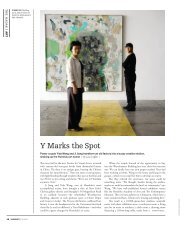The Scholarship of Teaching and Learning: TheoryâPractice - NAIRTL
The Scholarship of Teaching and Learning: TheoryâPractice - NAIRTL
The Scholarship of Teaching and Learning: TheoryâPractice - NAIRTL
Create successful ePaper yourself
Turn your PDF publications into a flip-book with our unique Google optimized e-Paper software.
<strong>The</strong> <strong>Scholarship</strong> <strong>of</strong> <strong>Teaching</strong> <strong>and</strong> <strong>Learning</strong> 9<br />
several ways. (1) Prior to the program, at a preliminary meeting with<br />
a facilitator, faculty participants are invited to discuss <strong>and</strong> present<br />
documented evidence <strong>of</strong> previous learning experiences considered<br />
equitable with program learning outcomes. With the exception <strong>of</strong> cohort<br />
meetings, this enables a participant to receive credit for prior learning,<br />
prevents unnecessary time commitments <strong>and</strong> duplication <strong>of</strong> learning<br />
experiences while maintaining the value <strong>of</strong> the cohort experience.<br />
Facilitators also provide formative feedback to individual faculty participants<br />
throughout the FCP related to progress <strong>and</strong> documentation<br />
on the SoTL. (2) Cohort members are given opportunities to provide<br />
<strong>and</strong> receive on-going peer-feedback with colleagues pertaining to actual<br />
classroom practices, peer-led workshop experiences, documentation on<br />
the SoTL contained in their program portfolios, <strong>and</strong> their contributions<br />
to the cohort learning experiences. (3) Individual faculty participants<br />
experience weekly self-reflection through the completion <strong>of</strong> journal<br />
reflections, the development <strong>of</strong> a teaching dossier, <strong>and</strong> specific action<br />
research assignments. (4) Finally, all faculty participants are required<br />
to complete an external peer-review interview at the end <strong>of</strong> the FCP<br />
in order to graduate. <strong>The</strong>se interviews are conducted by previous<br />
University <strong>of</strong> British Columbia FCP graduates who have demonstrated<br />
exemplary leadership <strong>and</strong> abilities with respect to the SoTL. <strong>The</strong><br />
purpose <strong>of</strong> these interviews is to engage each faculty participant<br />
in a reflective dialogue <strong>and</strong> to assess his/her program portfolio <strong>and</strong><br />
documentation on the SoTL.<br />
Programming Strategies<br />
Depending on Prior <strong>Learning</strong> Assessment (PLA), each faculty participant<br />
in this FCP context follows an individual learning plan which<br />
combines theory, practice, <strong>and</strong> critical reflection pertaining to a wide<br />
range <strong>of</strong> integrated learning experiences, including action research,<br />
peer-review <strong>of</strong> teaching practices, e-learning projects, discussion forums,<br />
peer-workshop presentations, guest presentations from teaching<br />
award winners, independent learning projects, <strong>and</strong> the construction<br />
<strong>of</strong> a teaching dossier. Since a community <strong>of</strong> practice is integral to the<br />
SoTL, the FCP is designed, in part, around a cohort model, whereby<br />
emphasis is placed on learning communities, collaboration, <strong>and</strong> peer<br />
feedback as a natural part <strong>of</strong> academic excellence. Moreover, this<br />
provides a forum to debate, practice, <strong>and</strong> evaluate philosophies, issues,<br />
<strong>and</strong> applications in higher education. For example, cohort members











